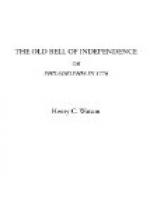“He was killed by a cannon-ball, I believe,” replied Smith.
“Yes,” said old Harmar. “A round-shot from the British artillery striking a sign-post in Germantown, glanced therefrom, and, passing through his horse, shattered the general’s thigh on the opposite side. The fall of the animal hurled its unfortunate rider with considerable force to the ground. With surprising courage and presence of mind, General Nash, covering his wound with both of his hands, called to his men, ’Never mind me, I have had a devil of a tumble; rush on, my boys, rush on the enemy—I’ll be after you presently.’ He could do no more.
Faint from loss of blood and the intense agony of his wound, the sufferer was borne to a house hard by, and attended by Dr. Craik, by special order of the commander-in-chief. The doctor gave his patient but feeble hopes of recovery, even with the chances of amputation, when Nash observed, ’It may be considered unmanly to complain, but my agony is too great for human nature to bear. I am aware that my days, perhaps hours, are numbered, but I do not repine at my fate. I have fallen on the field of honor, while leading my brave Carolinians to the assault of the enemy. I have a last request to make of his Excellency, the commander-in-chief, that he will permit you, my dear doctor, to remain with me, to protect me while I live, and my remains from insult.’ Dr. Craik assured the general that he had nothing to fear from the enemy; it was impossible that they would harm him while living, or offer insult to his remains; that Lord Cornwallis was by this time in the field, and that, under his auspices, a wounded soldier would be treated with humanity and respect. The dying patriot and hero then uttered these memorable words: ’I have no favors to expect from the enemy. I have been consistent in my principles and conduct since the commencement of the troubles. From the very first dawn of the Revolution I have ever been on the side of liberty and my country.’ “He lingered in extreme torture between two and three days, and died admired by his enemies, admired and lamented by his companions in arms. On Thursday, the ninth of October, the whole American army was paraded by order of the commander-in-chief, to perform the funeral obsequies of General Nash.”
“I have heard those who knew him best speak of him as a brave soldier and a noble-hearted man; and your account of his death assures me of the truth of their eulogy,” remarked Smith.
“It is said that Washington, seeing that his well-arranged plan was about to be defeated, could not control his anger and disappointment,” said Mr. Jackson Harmar.
“It is true. Washington, like all very great men, was naturally strongly passionate. His usual self-command was the more wonderful because it had been acquired by stern practice. The battle of Germantown was one of those few occasions in his life when his feelings burst through all restraint; and then, it is said by those who should know, that his wrath was fierce and terrible. The officers were compelled, by considerations of his safety, to lead his horse from the field. He did all that a man could do to rally his broken troops, and exposed himself as fearlessly as the bravest soldier. All his exertions were vain, however, and he became much irritated in consequence.”




